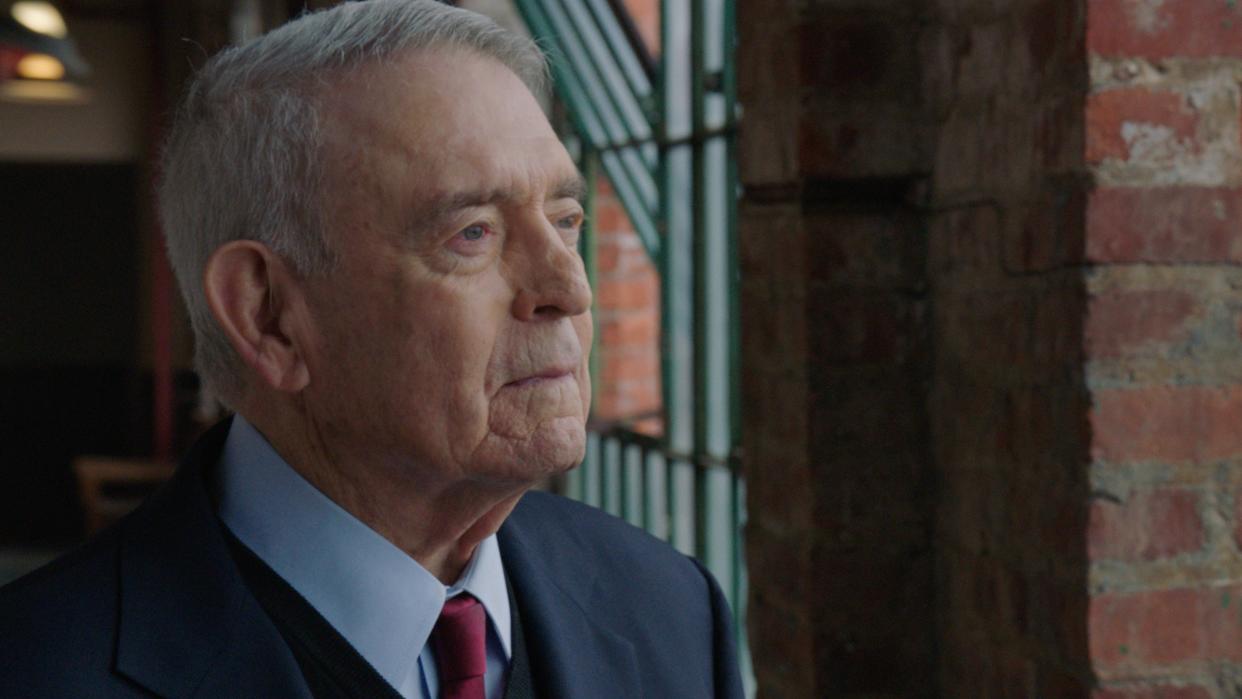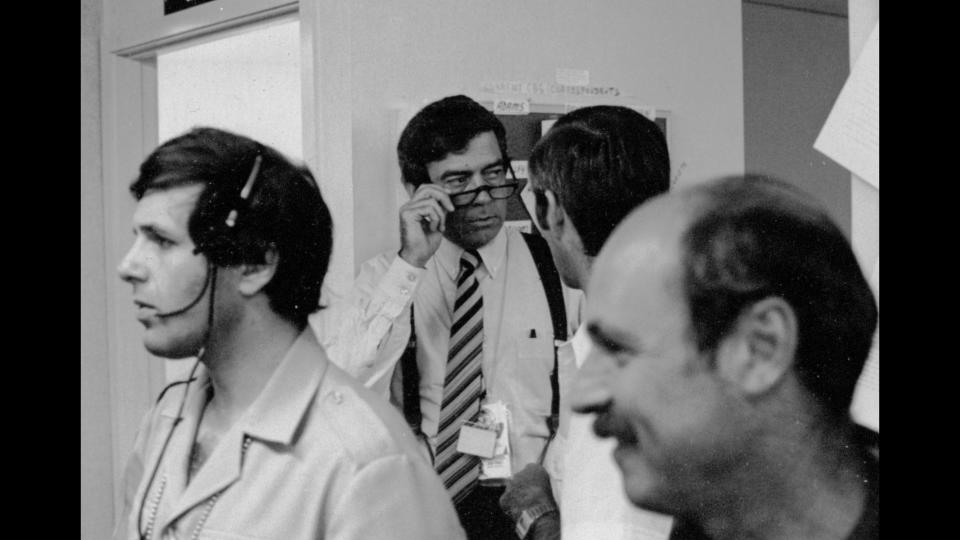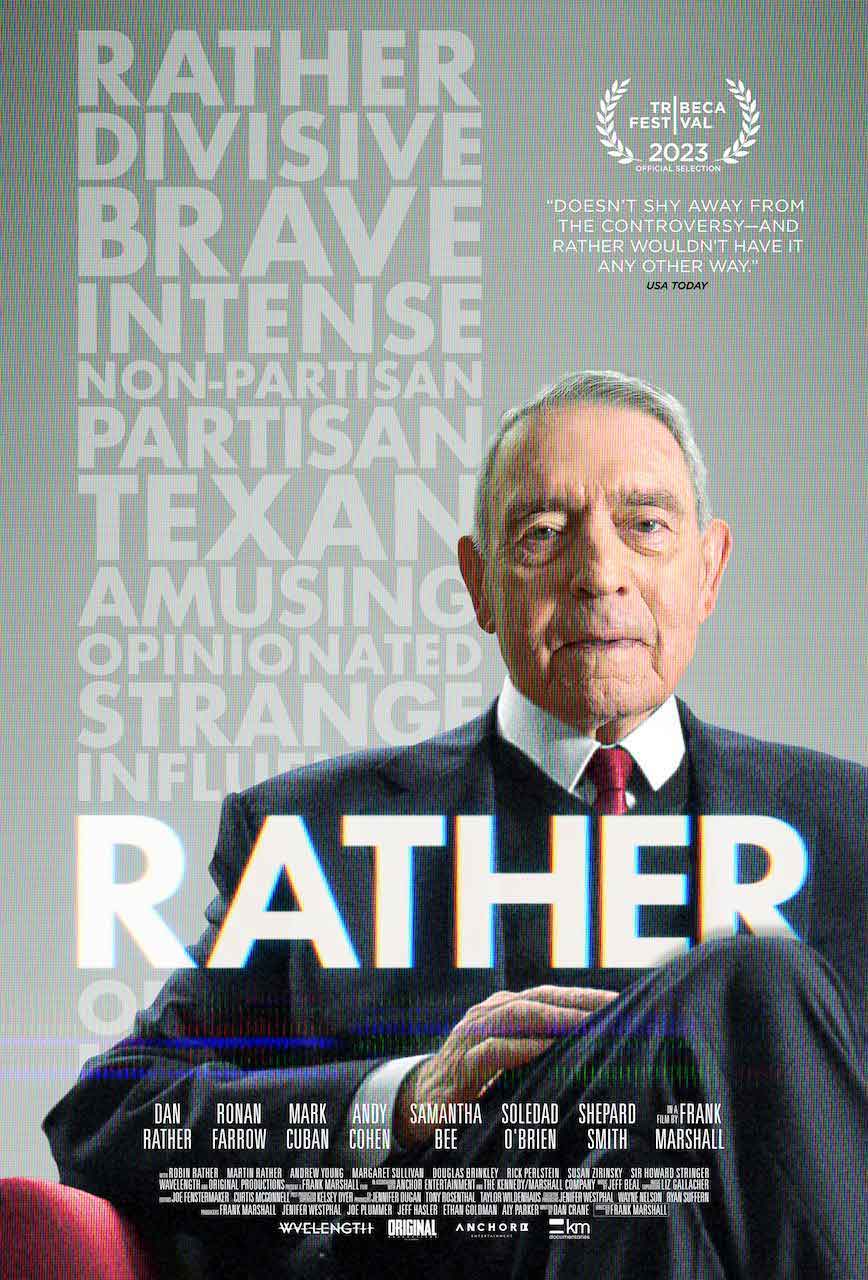'Steady. Courage.' Netflix's 'Rather' tells the story of one of America's top journalists

- Oops!Something went wrong.Please try again later.
- Oops!Something went wrong.Please try again later.
- Oops!Something went wrong.Please try again later.
- Oops!Something went wrong.Please try again later.
- Oops!Something went wrong.Please try again later.
- Oops!Something went wrong.Please try again later.
When it comes to summing up the legacy of a man who has been on the public stage for decades, historian and author David Brinkley has this to say about Dan Rather.
"Journalism is a higher calling, not a career," Brinkley concludes in the new documentary "Rather." "When you're looking at who were successful journalists over the last 50 years, Dan Rather would be at the very top of the list."
"Rather," available on Netflix on May 1, is as adroit, informed and, at times, intense as its subject matter. It does not stint on the controversies, including the reporting mistakes that ultimately ended Rather's career at CBS News. Yet for most of its 94 minutes, the documentary gives an unerring account of his history and, because of his vantage point in national media, ours.
Dan Rather: The early years
The movie does not start with Rather's childhood, but it records that he was born in 1931 in Wharton County, Texas, during the Great Depression. When he was 12, he developed debilitating rheumatic fever, something that informed the way he faced the rest of his life.
"While not as bad as polio, (it) is very bad," Rather told the American-Statesman in April 2020 at the start of the COVID-19 pandemic. "I was bedridden for the better part of two years. And I know that plenty of other people have gone through even tougher times."
His father and mother lent him the tools to get through this crisis, values that pop up in various ways during the documentary.
"First, live in the present. My mother had a saying: 'About yesterday, no tears, about tomorrow, no fears.' I’ve repeated that from time to time," Rather told the American-Statesman "The words 'steady' and 'courage' have had a lot of meaning to me. They were two of my father’s favorite words. When I was bedridden, he’d put his hand on me and say, 'Steady. Courage.'"
More: New book tells mind-bending history of Willie Nelson's Fourth of July Picnics
At his father's insistence, Rather rebuilt his body through hard outdoor labor. He recovered well enough to later join the U.S. Marines, but the service ousted him when Marines found out about his history with rheumatic fever. He attended high school in Houston and studied journalism at Sam Houston State Teachers College in Huntsville.
"Rather" swiftly records his debut in Houston-area radio during the early 1950s. He learned to improvise on the air, and he gained exposure to national TV audiences as a KHOU-TV reporter during devastating 1961 Hurricane Carla. His key innovation was not to brave the waves on the coast, as many remember him doing, but to superimpose a transparent satellite image of the giant storm over a map of Texas; more than 100,000 people subsequently evacuated.
Impressed, CBS News appointed Rather as bureau chief in Dallas, where he led the reporting on the 1963 assassination of President John F. Kennedy. He covered the civil rights movement on the ground, where the abuses against protesters pricked not only his conscience, but also that of the nation, which had not before seen the brutality of Southern racism in such bold, moving, inescapable images.
After a time as White House correspondent, Rather spent a year reporting on the Vietnam War in the field — an assignment he sought aggressively — and, once again, the nation could not turn its gaze from the raw violence or the dismal fates of American soldiers. This brought on vituperative personal calls from President Lyndon Baines Johnson, the kind of thing Rather wore as a badge of honor.
Rather became part of the news during the 1968 Democratic National Convention in Chicago when, trying to do his job, he was manhandled by convention security, not unlike what the autocratic Mayor Richard Daley's police force was doing to protesters outside the hall. During the early 1970s, he followed the Watergate scandal down every dark alley of President Richard Nixon's crimes and coverups.

Anchor of the 'CBS Evening News'
Among Rather's exploits during this period, some of them while he was a crucial part of the wildly successful "60 Minutes" news team, was going undercover in Afghanistan in 1980, disguised in local dress, after the Soviet invasion. Media critics who felt that this kind of reporting was a stunt called him "Gunga Dan," but once again Rather had demonstrated the value of one of his guiding principles — courage.
For a while, Rather used that word to sign off his broadcasts after he succeeded beloved anchor Walter Cronkite in 1982, at a time when most Americans retained a deep trust in the reporting by the three network news shows. Yet even those who admired Rather for his tenacity as an investigative and foreign journalist admitted that in the anchor's chair, he could appear rather stiff, distant, even a bit awkward, with little of Cronkite's avuncular warmth or, over time, not quite enough of the elder statesman's blanket credibility.
Even as anchor, Rather took on big, dangerous assignments, such as reporting live from Tiananmen Square in 1989. Yet into the Reagan years and later, Rather was drawn into the political Manichaeism of the era, accused of nurturing a liberal bias. Critics dismissed his journalism as slanted by pointing to his intense, insistent questioning of politicians and their representatives.
One particular turning point came in 1988 when he stepped into trap laid by conservative media advisor Roger Ailes. In what was supposed to be a short, general interview, Rather pressed a seemingly surprised Vice-President George H.W. Bush with questions about the Iran Contra scandal. The edge in Rather's voice was all that the right needed in order to discredit Rather's objectivity.
More: Once poisoned Treaty Oak, an Austin landmark, treated for apparent new vandalism
From that point on, Rather's demeanor became a rallying point for right, even when the facts supported his case. They mocked Rather when, in 1986, he was attacked on the streets of New York by a man repeatedly asking, "Kenneth, what's the frequency?" Later the culprit, who was convicted of murdering an NBC stagehand, was identified by multiple sources as Rather's attacker.
During the 2004 presidential election, CBS obtained documents that appeared to verify damning accusations about President George W. Bush's service in the Air National Guard during the Vietnam War, which some later said were forgeries. Rather charged ahead with a "60 Minutes" report.
A series of revelations ignited a firestorm. Rather apologized on air for the mistake, but that was not enough. He stepped down as anchor of the "CBS Evening News" in 2005. When he refused to blame one of his staffers for mistakes, according to the documentary, he was forced into retirement from CBS in 2006.
Dan Rather after CBS
To the surprise of few, the fallout from the Bush story did not stop Rather. From 2006 to 2013, he hosted an investigative series for HDNET (later AXS TV). In 2018, he began leading an online newscast, and since 2021 he has produced the newsletter "Steady" on Substack.
Along the way, Rather became a surprise superstar on social media through often humorous bursts of moral insight for turbulent times. The lack of restraint common on social media posts seems to suit his outspoken personality. As the documentary points out, he has become a hero for a generation who not only missed him altogether on the "CBS Evening News," but may have never seen a network newscast.
More: Texas history museum dissects treaty that ended Mexican American War and changed the world
"Rather" does not glide over his personal life, and his deep affection for Texas, where he keeps a Hill Country home with his wife, Jean Rather. It serves as the location for some of the documentary's interviews, especially the ones that share his perspectives on having spent such a long time on Earth.
"What old man do you know who doesn't want to tell you what he's learned out of life?" Rather says in the movie. "Working in television, social media — did he cover TiananmenSquare? Did he cover the Vietnam war? Did he cover Watergate? Did he cover the Kennedy assassination? As time moves along, that's not going to amount to very much. In the end, whatever remains of one's life — family, friends — those are going to be the things for which you will be remembered.
His daughter Robin Rather, who serves as a sort of emotional anchor for the documentary, confirms that her father is grounded in family life.

"As a journalist, he's all about courage," Robin says. "As a father, he's all about the love, absolute, unconditional love."
One of the surprisingly deft sources of wisdom in the movie is talk show host Andy Cohen, who once worked in the CBS newsroom. The documentary makers save this gem for the closing segments:
"There's just something sweet about this cowboy who is still at the rodeo," Cohen says. "Horse isn't riding as fast. He's not at the top. But he's still there. He's still exactly who he is. There's something poetic about that."
This article originally appeared on Austin American-Statesman: Documentary on Dan Rather adroit informed, intense as its subject

